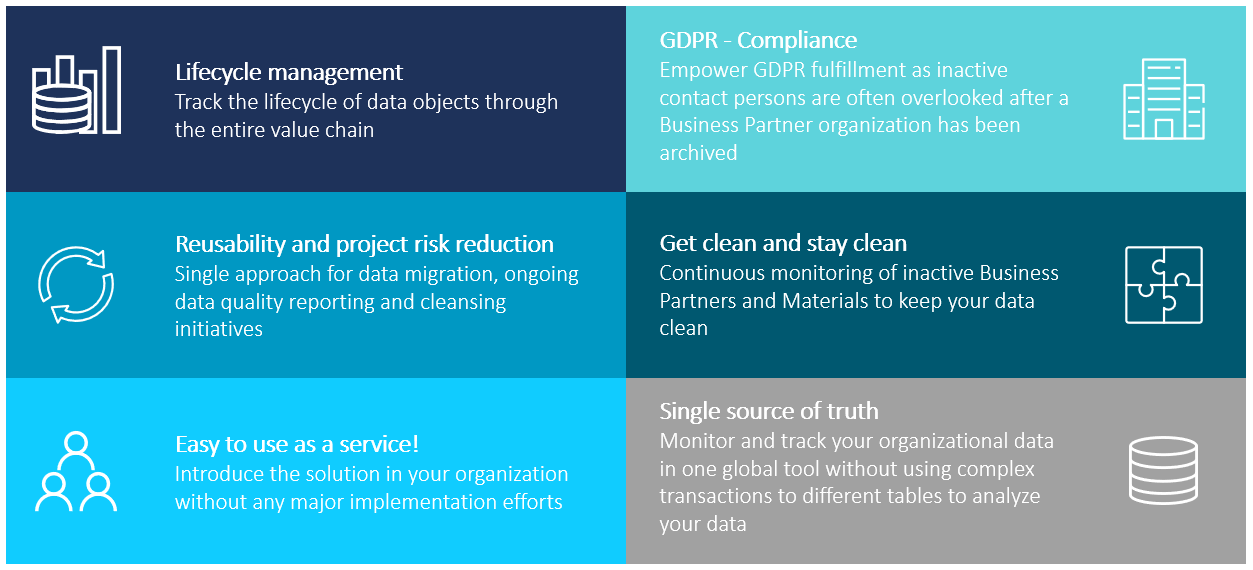Well-founded strategic and operational decisions are based on valid master data. In each and every organization, Business Partner master data is the foundation of tackling the challenges in today’s increasingly fast-paced world. In this article, you will learn:
- why it is important to work with up-to-date and valid Business Partner data, and
- why poor data quality has huge impact on your organization.
The Importance of Accurate Data: Lessons from the Leaning Tower of Pisa
What happens if someone makes decisions based on incorrect information?
In the worst case, you end up building the Leaning Tower of Pisa. The Leaning Tower of Pisa tilted due to uneven settlement of the foundation and insufficient knowledge of soil mechanics. Thus, it was built with a faulty design for the existing environment.
The architect of the Tower of Pisa was exonerated because knowledge of soil mechanics was limited at the time. Even though this mistake has made the Leaning Tower of Pisa one of the top tourist destinations today, it was a disaster at the time of its initial construction and later completion. In addition, 150 years later, extensive restoration work had to be carried out to stabilize the building and prevent it from tilting further.
Unfortunately, companies usually cannot count on the same stroke of luck to build something that later turns out to be a success for different reasons: they need precise knowledge for their decision-making.
What is the key takeaway from this story?
Decisions Based on Wrong Data Can Have a Huge Impact on the Success of Your Business
Businesses generate a vast amount of data every day, including customer and supplier data. Data is key to unlocking valuable insights that can drive business growth. But more data does not automatically lead to better results: this is only the case if the data quality is in good shape. Newly generated data need to be governed to ensure its accuracy and relevance. Especially Business Partner data can become outdated, redundant, or irrelevant over time, leading to a cluttered database. As this data is crucial to a variety of business processes, including procurement and sales, it should receive significant attention in your organization. How is Business Partner master data managed in your organization?
Why You Should Not Ignore the Value of Good Data Quality
Outdated and incorrect Business Partner data impacts multiple areas of your business and can have a significant implication on your business performance. This can lead to the following shortcomings:
- Inaccurate reporting and forecasting, which lead to wrong decisions
E.g., if the procurement and marketing department in your organization is not aware that a particular Business Partner is no longer running their business, they may continue to allocate resources and marketing efforts towards that entity, resulting in a waste of time and money.
- Missed opportunities
E.g., if a Business Partner has recently expanded into a new region or started offering new products, but this information is not updated in their profile. The purchase or sales department may not be aware of these changes and may miss out on potential collaborations or sales opportunities.
- Financial inaccuracies and delayed payments
E.g., if a supplier’s bank account is not updated, invoices cannot be paid, resulting in delayed payments and potential damage to the supplier relationship.
- Legal and regulatory implications (GDPR)
E.g., the European Union has strict regulations for handling Business Partner data. If your organization does not manage its Business Partner data correctly, it may not be acting in accordance with the regulations.
- Poor system performance
E.g., unused data requires additional system capacity, which results in bad system performance and a loss of time and resources.
If you find yourself in a situation as described above or have the general feeling the data quality of your master data is in poor conditions, act now. But how?
How Data Quality Management Tools Help Increase the Value of Your Data
Data Quality Management tools such as the Camelot Business Partner Data Analyzer help your business to manage customer and supplier master data accurately. The comprehensive logic analyzes master and transactional data in your SAP ERP system to identify inactive data records with the aim of achieving improvements in three areas:
- Boost the performance of your business processes by increasing the quality of your data
- Achieve high efficiency in data management by significantly reducing effort and time spent on inactive objects
- Help reduce the scope of the business, thereby reducing the data to govern
After running the Analyzer with your ERP system data, an interactive dashboard presents the results, enabling decision-making and facilitating discussion with various stakeholders.

The Camelot Business Partner Data Analyzer provides valuable insights about the current status of your Business Partner master data based on your SAP ERP systems.
- Lifecycle management: Track the lifecycle of data objects through the entire value chain
- Reusability and project risk reduction: Single approach for data migration, ongoing data quality reporting, and cleansing initiatives
- Easy to use as a service: Introduce the solution in your organization without any major implementation effort
- GDPR – Compliance: Empower GDPR fulfillment as inactive contact persons are often overlooked after a Business Partner organization has been archived
- Get clean and stay clean: Continuous monitoring of inactive Business Partners to keep your data clean
- Single source of truth: Monitor and track your organizational data in one global tool without using complex transactions to different tables to analyze your data
How You Can Benefit
The Camelot Business Partner Data Analyzer can contribute to the success of your business in various ways:
- Moving to SAP S/4HANA
The cloud-based Analyzer supports your organization during the transformation of your ERP systems. It reduces the amount of master and transactional data that needs to be migrated during an ERP implementation by identifying inactive data.
- Data quality monitoring
With the integrated data quality dashboard based on SAP SAC, you can perform continuous data quality monitoring. As part of any data quality initiative in your organization, the dashboard helps you ensure continuous readiness for transformation or integration projects.
- Data quality management initiatives
Data quality initiatives are easier to plan and execute with the Business Partner Data Analyzer. The service reduces the time-consuming data cleansing effort by eliminating unused data records and enables data preparation for complex data harmonization activities.
In order to manage the amount of business-critical data across all transactions in today’s world, the support of additional analysis tools, such as the Camelot Business Partner Analyzer, to evaluate your ERP data is essential. These tools ensure that all data is used efficiently across their specific business units, reduce the risk of errors, maximize the overall performance across business units – and avoid building a second Leaning Tower of Pisa.

